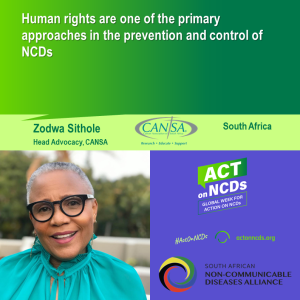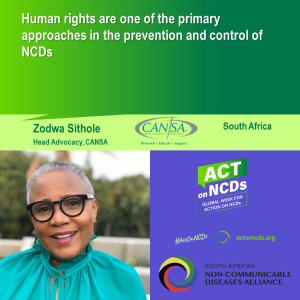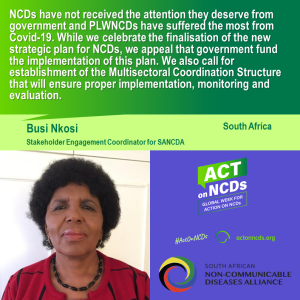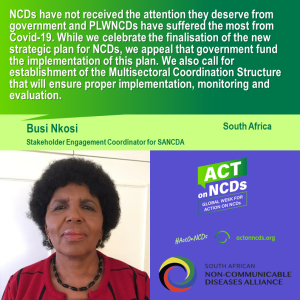This Global Week for Action on NCDs (6 – 12 September 2021), the South African Non-Communicable Diseases Alliance (SANCDA), of which the Cancer Association of South Africa (CANSA) is a founding partner, celebrate the progress made in raising the profile of people living with non-communicable diseases (NCDs) in SA. Together with other civil society members, the Global Week of Action on NCDs hails the power and potential of people to act together on and drive NCDs change. The aim is to ensure that commitments made by government to improve health for people living with NCDs, will become a reality. The challenges presented by COVID-19 will not compromise action to help relieve the NCDs burden.
#ActOnNCDs #NCDvoices
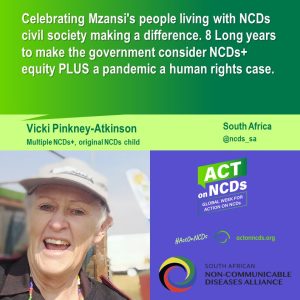 Dr Vicki Pinkney-Atkinson, Director of the SANCDA says, “In SA, the people’s NCDs movement struggles to make the government recognise and meaningfully involve diverse groups, including people living with NCDs to reduce the NCDs burden. Government and other stakeholders committed to global targets to prevent and control NCDs and improve the health of the nation. Now we need to these commitments translate into meeting the UN Sustainable Development Goals.”
Dr Vicki Pinkney-Atkinson, Director of the SANCDA says, “In SA, the people’s NCDs movement struggles to make the government recognise and meaningfully involve diverse groups, including people living with NCDs to reduce the NCDs burden. Government and other stakeholders committed to global targets to prevent and control NCDs and improve the health of the nation. Now we need to these commitments translate into meeting the UN Sustainable Development Goals.”
Many NCDs are preventable, yet they remain the number one cause of death and disability globally and in SA. Diabetes is still the leading cause of death in SA women. NCDs are mainly driven by five preventable risk factors: tobacco use, unhealthy diet, physical inactivity, harmful use of alcohol and air pollution. Weak health systems, under-investment and lack of accountability by government contributes to increasing the NCDs burden. NCDs include health conditions which usually don’t spread from person to person. Examples are cancers, diabetes and cardiovascular diseases (such as heart attacks and stroke), chronic respiratory diseases (such as chronic obstructive pulmonary disease and asthma) and mental health conditions.
“If every person exercises the right to participate in decision making about their health we would have more accountability for NCDs prevention and care. The SANCDA and our many partners urge the people, including those living with NCDs, to join us in our quest to accelerate action on NCDs. Together we will hold the authorities to account for meeting our needs. What we demand is understanding community needs better, helping to identify gaps, developing options in response to challenges, understand the impact of decisions on different people, and balance input, perspectives and interests,” adds Pinkney-Atkinson, herself living with more than 20 NCDs.
By working together, civil society and the SANCDA highlights the actions undertaken to close the NCDs gap. Achievements include:
- Teaming up with the Dullah Omar Institute with its expertise in constitutional law and human rights to explore how law and treaties advance the NCDs agenda. Legal measures against government for its failure to meet commitments to rights and equity are part of this.
- Working with the National Department of Health to craft the national NCDs policy (due for publication soon).
- Joining forces with local and global social movements representing people left behind, including those focussed on stigmatised NCDs conditions like disability, mental health and obesity.
- Coordinating consistent civil society policy action across all Sustainable Development Goals (SDGs) linked to NCDs prevention and control such as poverty, hunger, and emergency-disaster preparedness and responses to COVID-19.
- Calls for inclusive NCD governance mechanisms to secure the role of people living with NCDs and civil society in health policy at national, regional and international levels, since 2013. SANCDA endorses the Global Charter on Meaningful Involvement of People Living with NCDs. As a tool this will ensure meaningful involvement and transparency.
- Consistently communicating by leveraging outrage, rebuking injustice, translating evidence, sharing personal stories, celebrating successes, and campaigning collaboratively for the annual Global Week of Action on NCDs and other milestone days, weeks and political campaigns. It includes using traditional social media to make noise, demand change, and put issues, insights, and possible solutions in front of policymakers based on human rights and dignity..
Pinkney-Atkinson states, “During COVID-19, we experienced the devastating effects of neglect of NCDs and failure to invest in our health systems. Role players can prevent a repetition of this and can help close gaps and deliver progress on NCDs.”
#ActOnNCDs through social media
People affected by NCDs can be a voice of change by sharing their own messages of support by going to the Global Week for Action on NCDs Map of Impact on https://actonncds.org/take-action/be-a-voice-change . The Voices of Change online picture generator will quickly and easily upload a message and picture and share it on social media.
The SANCDA encourages all to get involved and share messages of support on social media platforms using the hashtags: #ActOnNCDs #NCDvoices. Or mobilise action and be an agent of change – https://actonncds.org/take-action/go-extra-mile
(For more information, please contact Vicki Pinkney-Atkinson, Director SANCDA email: [email protected] or mobile +27-83-38-38-159
Or
Lucy Balona, Head: Marketing and Communication at CANSA at email [email protected]. Call 011 616 7662 or mobile 082 459 5230.

